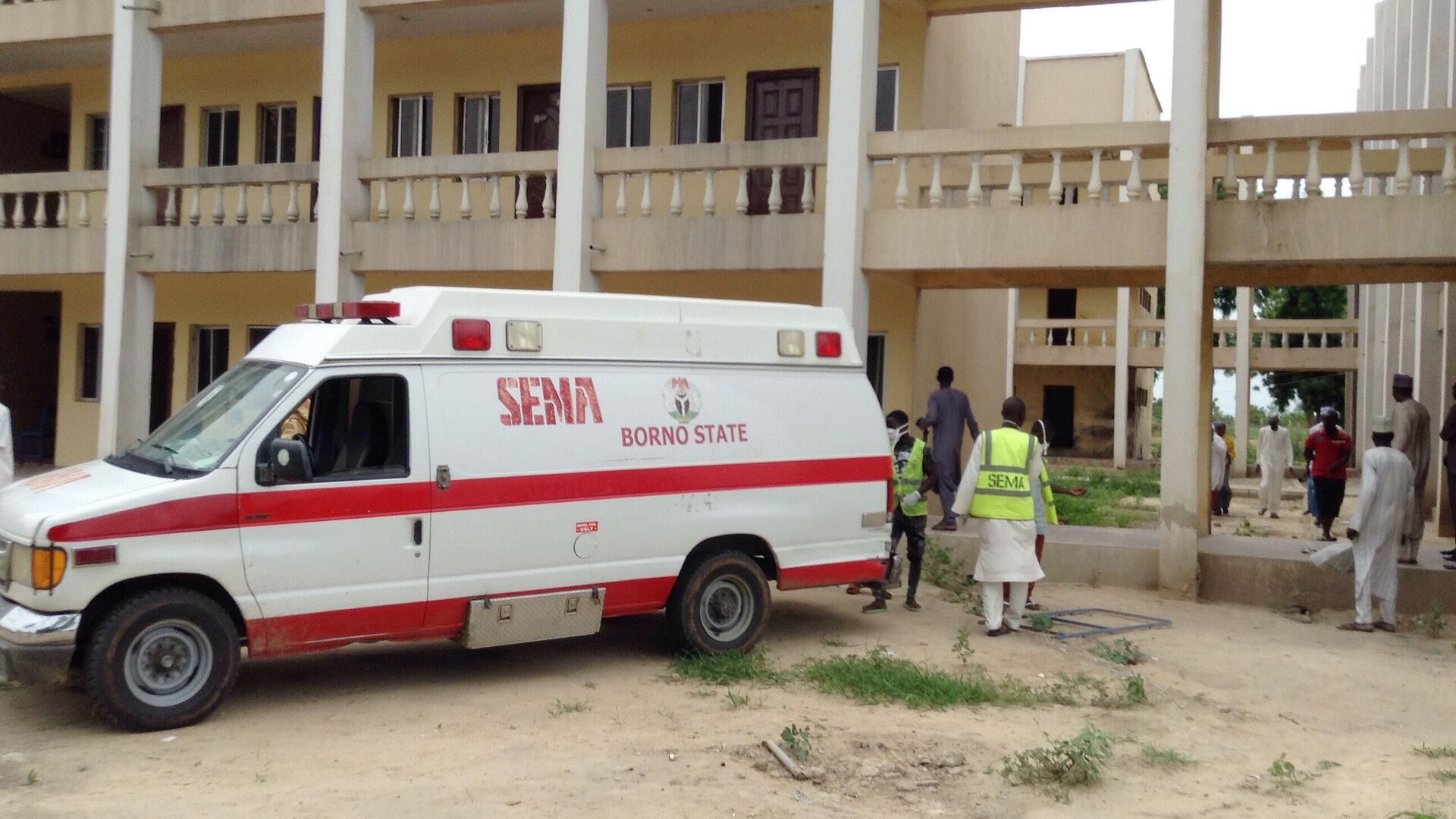https://sputnikglobe.com/20221211/nigerian-nephrologist-urges-govt-to-subsidize-kidney-transplant-costs-amid-economic-hardship-1105355515.html
Nigerian Nephrologist Urges Gov’t to Subsidize Kidney Transplant Costs Amid Economic Hardship
Nigerian Nephrologist Urges Gov’t to Subsidize Kidney Transplant Costs Amid Economic Hardship
Sputnik International
This article is about the call of Nigerian consultant nephrologist Dr. Chimezie Okwuonu, the former chair of the Nigeria Medical Association (NMA) branch office in Abia state, on the federal government of President Muhammadu Buhari and corporate organizations to subsidize the rising cost of a kidney transplant in the country.
2022-12-11T14:24+0000
2022-12-11T14:24+0000
2022-12-11T14:24+0000
africa
west africa
nigeria
kidney disease
transplant
health
https://cdn1.img.sputnikglobe.com/img/07e6/0c/0b/1105358696_0:292:2593:1750_1920x0_80_0_0_47df8d5912305a6836eb3511bd16fd9a.jpg
Nigerian consultant nephrologist Dr. Chimezie Okwuonu, the former chair of the Nigeria Medical Association (NMA) branch office in Abia state, has urged the federal government of President Muhammadu Buhari and corporate organizations to subsidize the rising cost of a kidney transplant in the country.During the fifth anniversary of the Kidney Transplant Program at the Federal Medical Center Umuahia in Abia state in the southeast of the country, Dr. Okwuonu said that economic hardship was one of the reasons for the early death of many Nigerian kidney patients who could not afford the high costs of a kidney transplant.The medical expert noted that kidney transplantation at the Federal Medical Center Umuahia, which is the only kidney transplant center in all of southeastern Nigeria, costs at least nine million Nigerian naira (about $20,300).Looking to “enumerate our challenges and discuss the way forward,” the doctor named rising prices of transplant equipment and the non-availability of willing kidney donors, along with continuous brain drain, as the main challenges facing kidney transplantation in the country, noting that early discovery of kidney-related sicknesses would put patients in an advantageous position.During the same event, the director of the Kidney Transplant Program, Dr. Anosike Erondu, suggested the establishment of a foundation that would subsidize kidney transplants in order to make it affordable for patients across Nigeria.According to medical experts, as of 2022, at least 20 million people suffer from kidney disease in Nigeria, including no fewer than 20,000 patients diagnosed with end-stage kidney disease (ESKD), which makes them need yearly dialysis and/or a transplant to survive.
africa
west africa
nigeria
Sputnik International
feedback@sputniknews.com
+74956456601
MIA „Rossiya Segodnya“
2022
Muhammad Nooh Osman
https://cdn1.img.sputnikglobe.com/img/07e4/08/0e/1080170965_2:0:2050:2048_100x100_80_0_0_1de8233c87df0979e7e74f61b6ffacad.jpg
Muhammad Nooh Osman
https://cdn1.img.sputnikglobe.com/img/07e4/08/0e/1080170965_2:0:2050:2048_100x100_80_0_0_1de8233c87df0979e7e74f61b6ffacad.jpg
News
en_EN
Sputnik International
feedback@sputniknews.com
+74956456601
MIA „Rossiya Segodnya“
Sputnik International
feedback@sputniknews.com
+74956456601
MIA „Rossiya Segodnya“
Muhammad Nooh Osman
https://cdn1.img.sputnikglobe.com/img/07e4/08/0e/1080170965_2:0:2050:2048_100x100_80_0_0_1de8233c87df0979e7e74f61b6ffacad.jpg
kidney transplant, kidney transplant in nigeria, subsidize kidney transplant costs, kidney transplant costs in nigeria,
kidney transplant, kidney transplant in nigeria, subsidize kidney transplant costs, kidney transplant costs in nigeria,
Nigerian Nephrologist Urges Gov’t to Subsidize Kidney Transplant Costs Amid Economic Hardship
Muhammad Nooh Osman
Writer/Editor
Kidney disease is among the most dangerous illnesses, especially if it develops into kidney failure, which in many cases leads to death. Technological progress in medicine has contributed to reducing the risk of the disease through kidney transplantation. However, not everyone can afford such high costs.
Nigerian consultant nephrologist Dr. Chimezie Okwuonu, the former chair of the Nigeria Medical Association (NMA) branch office in Abia state, has
urged the federal government of President Muhammadu Buhari and corporate organizations to subsidize the rising cost of a kidney transplant in the country.
During the fifth anniversary of the Kidney Transplant Program at the Federal Medical Center Umuahia in Abia state in the southeast of the country, Dr. Okwuonu said that economic hardship was one of the reasons for the early death of many Nigerian kidney patients who could not afford the high costs of a kidney transplant.
The medical expert noted that kidney transplantation at the Federal Medical Center Umuahia, which is the only kidney transplant center in all of southeastern Nigeria, costs at least nine million Nigerian naira (about $20,300).
“We saw from our data that we have patients that have N3 million, but they were not able to afford a transplant, even N4 million, N5 million, because our transplant program is N9 million, N7.5 million for the surgery and N1.5million for the tests that are required,” Dr. Okwuonu explained.
Looking to “enumerate our challenges and discuss the way forward,” the doctor named rising prices of transplant equipment and the non-availability of willing kidney donors, along with continuous brain drain, as the main challenges facing kidney transplantation in the country, noting that early discovery of kidney-related sicknesses would put patients in an advantageous position.
During the same event, the director of the Kidney Transplant Program, Dr. Anosike Erondu, suggested the
establishment of a foundation that would subsidize kidney transplants in order to make it affordable for patients across Nigeria.
According to medical experts, as of 2022, at least 20 million people suffer from kidney disease in Nigeria, including no fewer than 20,000 patients diagnosed with end-stage kidney disease (ESKD), which makes them need yearly dialysis and/or a transplant to survive.



